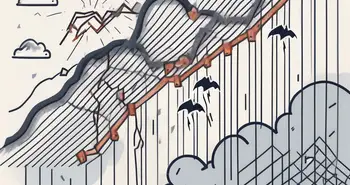Margin Call Exemplified: A Comprehensive Analysis of Financial Crisis Triggers

In the fast-paced world of finance, there are few things more nerve-wracking than receiving a margin call. This seemingly innocuous demand for additional funds can quickly snowball into a full-blown financial crisis, wreaking havoc on global markets and impacting economies on a massive scale. Understanding the concept of margin call and its role in triggering financial crises is key to navigating the treacherous waters of the investment landscape. In this comprehensive analysis, I will delve into the depths of margin calls, exploring their definition, importance, and the intricate relationship between margin calls and financial crises.
Understanding the Concept of Margin Call
Before we dive into the specifics, let's take a moment to understand what a margin call actually entails. When investors engage in margin trading, they effectively borrow funds from their broker to purchase securities. These borrowed funds, known as margin, serve as leverage, amplifying both potential gains and losses. To protect themselves, brokers require investors to maintain a minimum amount of equity in their margin accounts. This minimum equity requirement acts as a safety net, ensuring that investors have enough capital to cover potential losses.
Margin trading is a popular strategy among experienced investors who seek to maximize their returns. By using borrowed funds, investors can increase their purchasing power and potentially generate higher profits. However, this strategy also comes with significant risks. The concept of a margin call is a crucial aspect of margin trading, as it serves as a mechanism to maintain market stability and protect both investors and brokers.
Definition and Importance of Margin Call
A margin call occurs when the value of an investor's margin account falls below the minimum equity requirement set by the broker. When this happens, the broker demands additional funds to restore the account to its required level. Failure to comply with a margin call can result in the forced liquidation of assets to cover the debt, potentially causing a sharp decline in asset prices.
The importance of margin calls lies in their ability to mitigate risk in the financial system. By maintaining minimum equity requirements, brokers limit the amount of leverage investors can employ. This helps prevent excessive speculation and reduces the likelihood of systemic collapses caused by overextended positions.
When a margin call is issued, it serves as a wake-up call for investors. It forces them to reevaluate their positions and assess the level of risk they are exposed to. Margin calls act as a safeguard, ensuring that investors maintain a certain level of financial stability and preventing them from taking on more risk than they can handle.
The Role of Margin Call in Financial Markets
Margin calls play a crucial role in maintaining market stability. They act as a mechanism to curb excessive risk-taking, prompting investors to reassess their positions and allocate funds more prudently. When investors receive margin calls, they are forced to either inject additional capital into their accounts or liquidate assets, which can have a cascading effect on asset prices.
During periods of heightened market volatility, margin calls can exacerbate downward price movements. As investors rush to meet their margin requirements, selling pressure increases, potentially leading to a vicious cycle of falling prices. The domino effect of margin calls can amplify market downturns and contribute to the onset of financial crises.
It is important to note that margin calls are not inherently negative. They serve as a necessary mechanism to maintain market discipline and prevent excessive risk-taking. By enforcing minimum equity requirements, margin calls help ensure that investors are operating within their means and discourage reckless behavior that could destabilize the financial system.
In conclusion, understanding the concept of margin call is essential for investors engaging in margin trading. It is a mechanism that protects both investors and brokers by maintaining minimum equity requirements and curbing excessive risk-taking. Margin calls play a vital role in maintaining market stability and preventing systemic collapses caused by overextended positions. By prompting investors to reassess their positions and allocate funds more prudently, margin calls contribute to a healthier and more sustainable financial system.
The Anatomy of a Financial Crisis
Financial crises are complex events, usually characterized by widespread panic, asset price collapses, and a breakdown of the financial system. While many factors can contribute to the onset of a crisis, certain triggers often play a significant role. Understanding these triggers is crucial for investors and policymakers alike to identify early warning signs and implement preventative measures.
Identifying the Triggers of a Financial Crisis
Financial crises can be ignited by a variety of triggers, ranging from economic imbalances to policy failures. Common triggers include asset bubbles, excessive debt levels, sharp declines in asset prices, and systemic banking failures. By closely monitoring these factors and their interplay, we can gain valuable insights into the potential vulnerabilities present within the financial system.
The Impact of Financial Crises on Global Economy
The repercussions of financial crises extend far beyond the financial sector. As the crisis spreads, it can lead to a contraction in economic activity, mass layoffs, and a decline in consumer and business confidence. The ripple effects of a financial crisis can be felt around the world, with economies interconnected and interdependent in the globalized era.
The Relationship Between Margin Calls and Financial Crises
Margin calls and financial crises often go hand in hand, with margin calls acting as a catalyst for market turmoil. Understanding the relationship between these two phenomena is crucial for investors seeking to navigate turbulent times and mitigate risks.
How Margin Calls Can Precipitate a Crisis
When investors are hit with margin calls during a downturn, they often find themselves in a precarious position. Forced to sell assets to raise capital, they further contribute to downward price pressure, potentially triggering a vicious cycle of margin calls and asset sell-offs. This self-reinforcing feedback loop can rapidly escalate into a full-blown financial crisis.
The Domino Effect of Margin Calls
As margin calls are met with selling pressure and asset prices plummet, other investors who traded on margin may face margin calls as well. This domino effect can quickly spread throughout the financial system, posing a significant systemic risk. The interconnectedness of markets amplifies the impact of margin calls, making them a potent force in triggering and exacerbating financial crises.
Mitigating the Risks of Margin Calls
While margin calls carry inherent risks, there are strategies investors can employ to minimize their exposure and protect their portfolios.
Strategies for Investors to Limit Exposure
Diversification is key when it comes to mitigating margin call risks. By spreading investments across different asset classes and geographies, investors can reduce their dependency on a single market and capitalize on potential diversification benefits. Additionally, maintaining a conservative approach to leverage and regularly reassessing risk tolerance can help investors avoid being caught off guard by margin calls.
Regulatory Measures to Prevent Excessive Margin Calls
Regulators also play a critical role in mitigating the risks associated with margin calls. Stricter margin requirements, transparent disclosure rules, and increased oversight of market participants can help prevent excessive risk-taking and curb the potential for systemic collapses. By implementing effective regulations, authorities can ensure that margin calls are employed as a risk management tool rather than a source of instability.
The Future of Margin Calls in a Changing Financial Landscape
As we enter an era of rapid technological advancements and evolving market dynamics, the landscape of margin calls is bound to change.
The Influence of Technology on Margin Calls
Advancements in financial technology, such as automated trading systems and algorithmic risk management tools, are reshaping the way margin calls are generated and managed. These technological innovations offer the potential to enhance risk management processes, streamline margin call procedures, and improve investor education, ultimately making markets more resilient to potential crises.
Predicting and Preparing for Future Crises
While it is impossible to predict the timing and exact triggers of future financial crises, a proactive approach can help investors prepare for potential downturns. Conducting thorough due diligence, diversifying portfolios, and staying informed about macroeconomic trends can provide investors with a solid foundation to weather any storm that may come their way.
FAQs
What is a margin call?
A margin call occurs when an investor's margin account falls below the minimum equity requirement set by the broker. It requires the investor to deposit additional funds to bring the account back to the required level.
How do margin calls contribute to financial crises?
Margin calls can contribute to financial crises by triggering a downward spiral in asset prices. When investors are forced to sell assets to meet margin requirements, it accelerates selling pressure and can lead to a self-reinforcing cycle of margin calls and asset sell-offs.
What can investors do to mitigate the risks of margin calls?
Investors can mitigate the risks of margin calls by diversifying their investments, maintaining a conservative approach to leverage, and regularly reassessing their risk tolerance. These strategies can help ensure that investors are better prepared to navigate crises.
What role do regulators play in preventing excessive margin calls?
Regulators can prevent excessive margin calls by imposing stricter margin requirements, implementing transparent disclosure rules, and increasing oversight of market participants. These measures aim to curb excessive risk-taking and promote market stability.
How is technology shaping the future of margin calls?
Technological advancements, such as automated trading systems and algorithmic risk management tools, are reshaping margin call processes. These innovations offer the potential to enhance risk management, streamline procedures, and improve investor education, thereby making markets more resilient.
How can investors prepare for potential financial crises?
To prepare for potential financial crises, investors should conduct thorough due diligence, diversify their portfolios, and stay informed about macroeconomic trends. By staying proactive and informed, investors can position themselves to weather any storm that may arise.
As you navigate the complexities of margin calls and prepare for the unpredictable nature of financial markets, consider the innovative solutions offered by Morpher. Embrace the future of trading with a platform that provides zero fees, infinite liquidity, and the flexibility of fractional investing and short selling. With Morpher, you gain the safety and control you need, along with the opportunity to leverage your trades up to 10x. Don't just trade; trade smarter and stay ahead of the curve with Morpher's unique blockchain-based trading experience. Sign Up and Get Your Free Sign Up Bonus today, and transform the way you invest in the global markets.
Disclaimer: All investments involve risk, and the past performance of a security, industry, sector, market, financial product, trading strategy, or individual’s trading does not guarantee future results or returns. Investors are fully responsible for any investment decisions they make. Such decisions should be based solely on an evaluation of their financial circumstances, investment objectives, risk tolerance, and liquidity needs. This post does not constitute investment advice.

Painless trading for everyone
Hundreds of markets all in one place - Apple, Bitcoin, Gold, Watches, NFTs, Sneakers and so much more.

Painless trading for everyone
Hundreds of markets all in one place - Apple, Bitcoin, Gold, Watches, NFTs, Sneakers and so much more.










